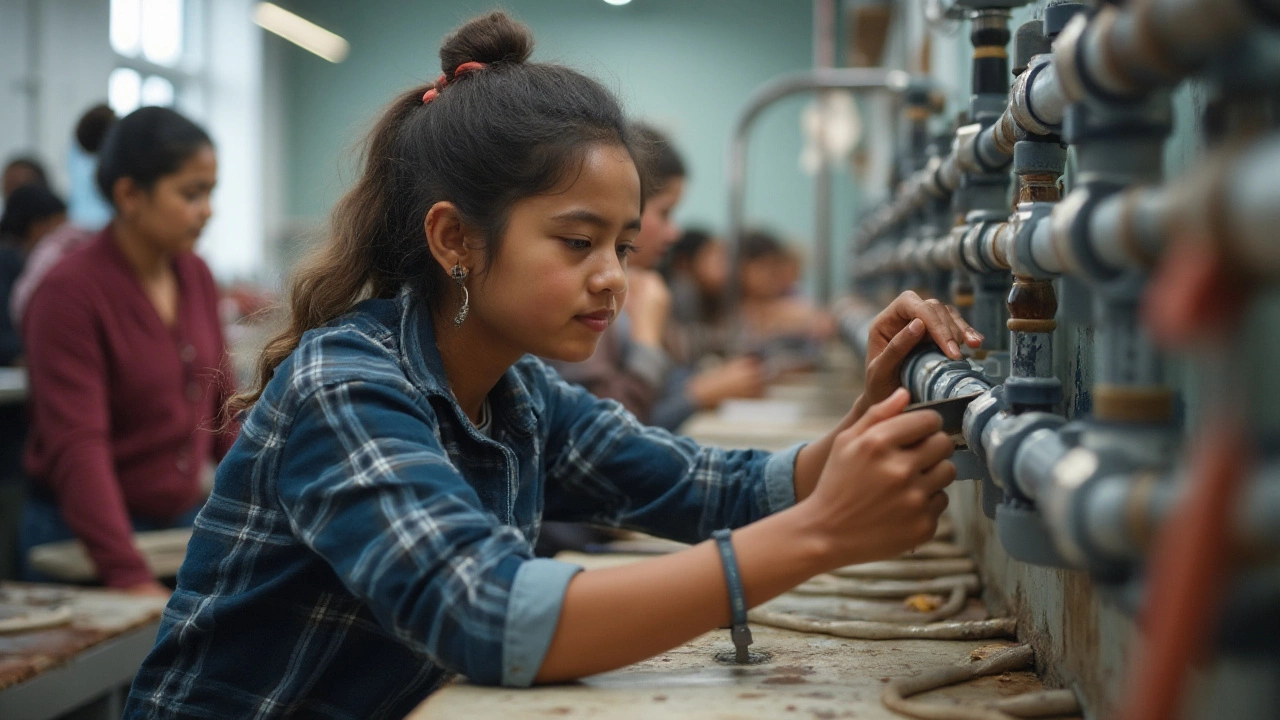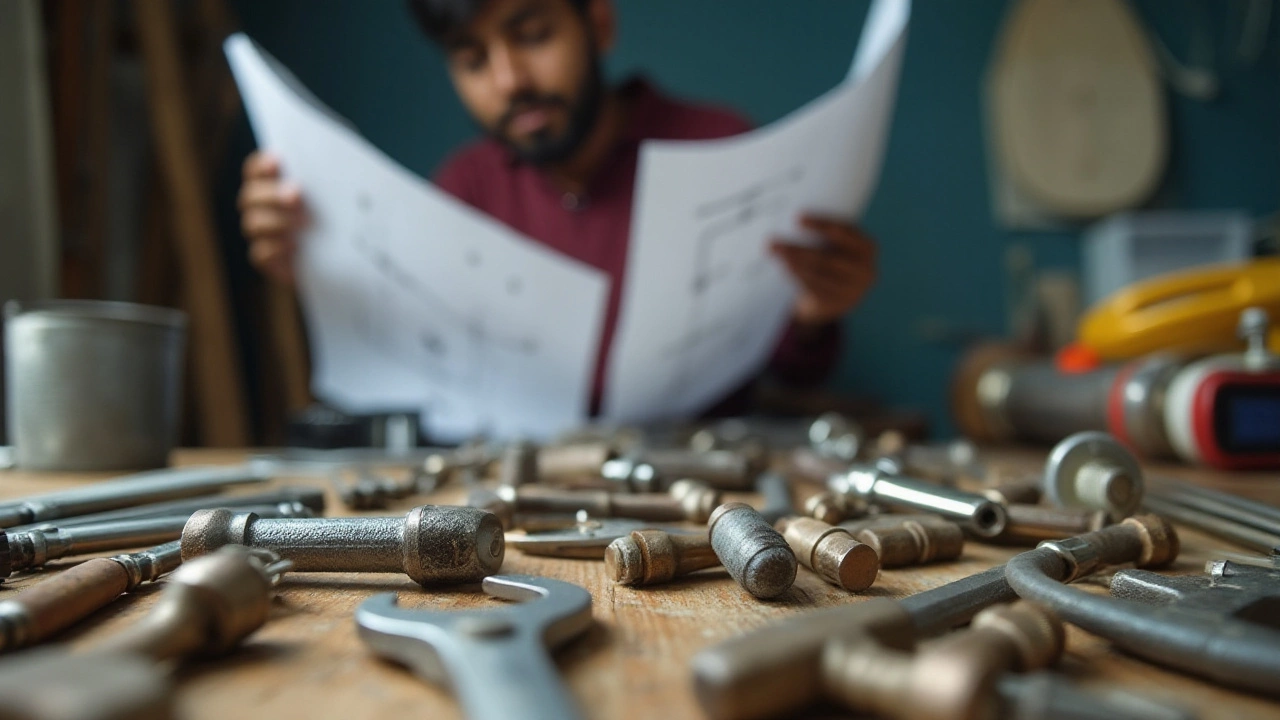Discover the Simplest Tech Course in Plumbing: A Learner's Guide
 Jan, 21 2025
Jan, 21 2025
If you're eyeing a career in the trades, plumbing offers a solid path with a host of opportunities. You might think plumbing involves complex mathematics and heavy tools, but some courses make learning the craft surprisingly straightforward.
In this article, we'll uncover the easiest tech course that will help you dive into plumbing with confidence. From understanding basic systems to performing essential skills, you can find a course that suits your pace and learning style. Whether you’re a beginner aiming to fix your own leaks or someone considering a professional career, this guide will illuminate the plumbing training that simplifies a seemingly intricate field.
- Introduction to Plumbing Technology
- Essential Skills for Beginners
- Top Easy Plumbing Courses
- Practical Tips for Success
- Career Opportunities in Plumbing
- Conclusion: Starting Your Plumbing Journey
Introduction to Plumbing Technology
Diving into the world of plumbing technology can seem like an overwhelming task, yet it's a journey that offers immense satisfaction and practicality. At its core, plumbing technology revolves around the systems and fixtures involved in distributing water to, and flushing waste out of, buildings. It's a field that blends traditional hands-on skills with modern technological advancements, ensuring smooth and efficient water flow and sanitation solutions in residential, commercial, and industrial settings.
The scope of plumbing isn't just about fixing leaks; it encompasses a wide range of systems including heating and cooling, gas supply, rainwater harvesting, and even certain aspects of fire suppression. As technology progresses, these systems have become more sophisticated, incorporating elements like smart systems that allow remote monitoring and control. This modernization makes plumber training even more exciting for newcomers looking to blend old-world craftsmanship with 21st-century tech.
A crucial aspect of starting in plumbing is understanding the materials you'll frequently work with, such as PVC, copper, and PEX piping. Each material has its own set of characteristics and is used in different applications, making it vital for learners to get acquainted with these early on in their plumbing course. One common tool in the plumber's toolkit is the pipe wrench, a symbol of the trade you'll soon become comfortable with during your training.
To truly enjoy the rewards of this trade, many suggest looking into reputable courses that focus not only on essential skills but also teach modern innovations in plumbing. According to Jake Lawson, a well-respected figure in the plumbing community,
"Success in plumbing lies not in the tools you own, but in the understanding of systems and processes; that's where true mastery begins."His words encapsulate the blend of theory and practice which is vital to thriving in this profession.
Understanding the job outlook for plumbers may also inspire your decision. Data shows that employment in plumbing is expected to grow in the coming years as infrastructure expands and existing buildings require maintenance. The Bureau of Labor Statistics suggests that employment for plumbers, pipefitters, and steamfitters is projected to grow, with steady demand due to new construction and the need for maintenance on existing systems.
In exploring easy plumbing courses, it's essential to examine the curriculum thoroughly. Courses typically cover the basics of plumbing systems, hands-on workshops, and safety protocols. By choosing well-structured programs that incorporate ample real-world scenarios, aspiring plumbers can solidify their understanding and build confidence in their practical abilities.
Essential Skills for Beginners
Venturing into the world of plumbing can seem daunting at first, but by focussing on acquiring the essential skills, any beginner can become adept in this vital craft. To start, it’s essential to grasp the fundamental aspects of plumbing systems. This includes understanding water pressure, types of pipes, and how they all work together in a seamless flow. Familiarizing oneself with basic tools such as pipe wrenches, plungers, and pipe cutters is another foundational step. A solid understanding of their uses and limitations goes a long way in building confidence in handling hands-on projects.
Hands-On Learning: A Critical Element
Hands-on practice is a cornerstone of learning for aspiring plumbers. Engaging directly with the tools and materials allows for better retention of the skills taught in the coursework. A simple home project, such as fixing a leaky faucet, provides invaluable experience. This tactile experience reinforces classroom learning and builds practical confidence. Indeed, instructors often emphasize, "In plumbing, touching is learning," signifying the importance of firsthand engagement over theoretical knowledge alone. Resources like workshops or apprentice roles provide excellent platforms for live demonstrations and troubleshooting techniques on-the-fly.
Understanding Safety Protocols
Safety in plumbing isn't just about wearing goggles and gloves, although these are critical. It's about understanding the potential hazards, like dealing with gas pipes or high-pressure systems. Adopting safe practices is paramount, as highlighted by the American Society of Plumbing Engineers, which states, "Effective safety precautions can prevent up to 90% of on-the-job accidents." Courses often include a significant focus on safety, teaching the proper responses to emergencies. Recognizing and mitigating dangers helps ensure that all tasks are carried out without risk to personal safety or that of clients’ homes.
Problem-Solving and Analytical Skills
The ability to diagnose and solve problems is a crucial skill for any budding plumber. Integrating technical knowledge with analytical skill allows plumbers to identify the root cause of issues efficiently. Beginners should cultivate a mindset that views challenges as puzzles rather than problems, developing their skills through experience, inquiry, and reflection. Undertaking repair tasks under the guidance of experienced practitioners or mentors can provide meaningful insights into more complex plumbing systems.
Tony Rogers, a master plumber with over 20 years of experience, once said, "A great plumber is a great detective; every pipe tells a story."
In essence, the journey to mastering easy plumbing courses involves embracing the foundational skills of the trade, enabling beginners to not only understand but also apply their learning in practical settings. It’s these essential skills that serve as the building blocks for a successful future in the world of plumbing.

Top Easy Plumbing Courses
Choosing the right plumbing tech course can set the foundation for a rewarding career. The question often arises: "What makes a plumbing course easy?" Well, clarity in instructional materials and hands-on experience are crucial. Some courses are designed specifically for beginners, enabling them to learn without feeling overwhelmed. These courses often focus on core competencies, breaking down complex topics into digestible lessons. The aim is to make the training accessible while ensuring thorough knowledge of fundamental plumbing techniques. These include tasks like straightforward pipe installation, routine maintenance checks, and simple troubleshooting.
One of the recommended courses is offered by online platforms such as Coursera. These courses provide a blend of theory and practice, aiding in the comprehension of plumbing basics. The flexibility of an online setting allows you to schedule study time around your commitments. Additionally, courses often come with video tutorials that visually demonstrate tasks, enhancing understanding. A notable perk of some programs is they offer forums where you can discuss on-the-job challenges with seasoned professionals and peers. Such interactions can prove invaluable, offering insights that aren’t typically found in textbooks.
An available course that has been well-received by beginners focuses primarily on residential plumbing systems. This course covers everything from fixing leaky faucets to replacing showerheads. It provides interactive modules where learners can participate in virtual simulations of real-world plumbing scenarios. This particular approach aids in honing skills in a low-risk environment. Some students find this hands-on simulation approach less intimidating, as it affords them the chance to practice repeatedly without any repercussions.
"A simplified, yet comprehensive plumbing course can transform curious novices into competent hands," shares John Mentor, a seasoned instructor at the Plumbing Education Institute.
Among traditional, in-person classes, many technical schools and community colleges offer short-term courses aimed at demystifying plumbing. These often span six to eight weeks, providing focused, intensive training. During this time, students gain experience with the tools of the trade. Interestingly, some statistics suggest that students who engage in both classroom instruction and workshop practice are more likely to retain the information over long periods. Here's a small table that illustrates the completion rate for hybrid learning models:
| Learning Model | Completion Rate |
|---|---|
| Online-Only | 65% |
| Hands-on Only | 72% |
| Hybrid | 85% |
Overall, choosing the right plumbing course depends on your learning preference and career goals. Whether you opt for an online course with flexibility or a hands-on class with intense practice, remember that persistence and dedication are key. Use the resources available to you—engage with mentors, take advantage of forums, and don't be afraid to make mistakes in a learning setting. Once you're equipped with the basics of plumbing, a host of opportunities await. Starting with a properly structured course could very well be your gateway to a prosperous future in plumbing.
Practical Tips for Success
Embarking on a plumbing tech course is a wise decision, especially if you're keen on combining technical skills with steady job prospects. The journey to becoming proficient in plumbing involves more than just the mechanics of pipework; it requires strategy, patience, and dedication. One of the first tips for thriving in this field is to engage actively with the materials and tools right from the start. Rather than simply reading about *plumber training* techniques, immerse yourself in the hands-on experiences these courses offer. Get a feel for the tools in your hand, understand the textures and weights, and practice basic tasks repeatedly. This tactile relationship with your work will lay the groundwork for more complex plumbing tasks down the line.
"Tell me and I forget. Teach me and I remember. Involve me and I learn." – Benjamin Franklin
Understanding the theoretical concepts behind plumbing is just as crucial as mastering practical skills. Dedicate a portion of your study time to learning about plumbing systems, water pressure dynamics, and the science of fluid mechanics. This knowledge will empower you to troubleshoot problems effectively and make informed decisions in varying plumbing scenarios. Many *easy plumbing courses* integrate both practical and theoretical elements to ensure you receive a well-rounded education. Review your course’s curriculum and allocate time to study each part in tandem, reinforcing your newfound skills with real-world context.
The path to success is also paved with good habits. In a *plumbing training* environment, punctuality, organization, and anticipation of challenges are vital traits. Always arrive for your classes prepared with the necessary tools and equipment. Keep your workspace orderly to prevent lost items and accidents. By cultivating these habits, you establish yourself as a reliable and efficient learner, qualities that will benefit you immensely in your professional career. During training, asking questions is key. Never hesitate to seek clarification from your instructors. Their insights are invaluable, and engaging with them can open up new ways of understanding your tasks.
Building a Support Network
Being in a learning environment gives you the chance to connect with fellow students and instructors. A support network can provide encouragement, diverse perspectives, and motivation when faced with challenges. Engage in study groups, participate in discussions, and share your experiences. This mutual exchange not only enhances learning but also builds relationships that can extend into your professional life. Having peers who understand the rigors of your training can make the process more enjoyable and less isolating. As you progress in your *plumber training course*, these connections may prove invaluable.
Finally, stay updated with industry innovations. Plumbing technology is ever-evolving with new tools, techniques, and technologies introduced regularly. Subscribe to relevant magazines, join online forums, and follow industry leaders on social media to stay ahead of the curve. Engaging with these resources can provide inspiration and keep your skills relevant in a competitive market. Investing time in learning about advancements will ensure you remain a sought-after professional long after completing the *easy plumbing course*. Your enthusiasm and commitment to lifelong learning will shine, making you an asset in the plumbing field.

Career Opportunities in Plumbing
Embarking on a career in plumbing can open doors to a wide range of opportunities that promise stability and growth. While many might initially view plumbing as a hands-on, less glamorous trade, it's crucial to recognize its crucial role in modern infrastructure and daily life. As cities expand and technology integrates more into household systems, the need for skilled plumbers only increases. This demand translates directly to a variety of job opportunities, each with its own unique challenges and rewards.
One of the most straightforward career paths within plumbing is becoming a residential plumber. These professionals specialize in fixing issues within homes, such as leaking faucets, clogged drains, and malfunctioning toilets. Residential plumbing demands a keen understanding of domestic water systems and customer service skills, as interacting with homeowners is a regular part of the job. Those who prefer working on a larger scale may find commercial plumbing more fitting. This sector involves setting up and maintaining plumbing systems in businesses, schools, and hospitals, and requires more complex problem-solving skills.
The industrial plumbing sector presents opportunities for those who wish to work on a grander scale with even more complex systems. Industrial plumbers are essential in factories and manufacturing plants, ensuring that machinery that uses water functions correctly and efficiently. The role often requires specialized knowledge, but it also comes with the potential for slightly higher pay due to the intricacies and scale of the work involved. For those with an entrepreneurial spirit, starting a plumbing business is also a viable option. With the right skills and business acumen, a plumber can establish their own company, providing a substantial income and job flexibility.
According to the U.S. Bureau of Labor Statistics, "The employment of plumbers, along with pipefitters and steamfitters, is projected to grow 4 percent from 2022 to 2032, a rate nearly as fast as the average for all occupations."
The growth in the field isn’t limited to just traditional roles; specialized areas like green plumbing offer exciting new frontiers. With a focus on sustainability, green plumbers help create systems that conserve water and enhance energy efficiency. This specialization not only caters to eco-conscious clients but also aligns with governmental policies pushing for green technologies, making those skilled in this area highly sought after. Additionally, continuing education and certifications can further enhance career prospects, allowing plumbers to stay relevant in an ever-evolving industry.
Speaking of financial prospects, the plumbing industry offers competitive wages and benefits. Experienced plumbers or those with a strong specialization can expect higher earnings, especially if they are willing to relocate to areas experiencing high demand. Another noteworthy fact is that plumbing careers often offer stability even during economic downturns, as the need for plumbing repairs tends to remain steady. In summary, by venturing into a plumbing career, you are not only choosing a trade that provides critical services but also stepping into a field that offers numerous paths for personal and professional growth.
Conclusion: Starting Your Plumbing Journey
Embarking on a journey to become proficient in plumbing is not just about acquiring skills; it’s about crafting a career that stands the test of time and technological advancement. The plumber training courses provide a sturdy foundation for anyone stepping into this field, emphasizing the ease of starting with the basics before moving on to more complicated systems. These courses demystify plumbing, introducing concepts in bite-sized, easily digestible formats, ideal for anyone stepping into the field with little or no experience.
The journey starts with understanding the fundamental concepts, such as how water systems work in residential and commercial buildings. This includes learning about pipe systems, leak detection, and repair tactics. Many training programs offer hands-on experience, which is crucial as plumbing is a trade that thrives on practical knowledge. Dive into courses that highlight both theory and hands-on practice, ensuring you not only understand the mechanics but also build the confidence to fix issues effectively. As you learn, your confidence builds, tackling everyday issues, knowing you're becoming an important part of a homeowner's life.
Moreover, easy plumbing courses often incorporate problem-solving workshops, which are vital. Graduates often remark on the advantage of tackling real-world scenarios during their training. It prepares them for those surprise challenges that inevitably pop up in the plumbing world. This kind of learning solidifies one’s ability to analyze problems and craft solutions efficiently. With the skills learned, you're not merely learning to be a technician but a thinker who can innovate in pressing situations. As the well-known trade author John Harrison once said,
“The best technicians are those who see opportunities in challenges and never stop learning.”
As we look towards the future, the demand for skilled plumbers remains robust. According to recent labor statistics, employment in plumbing is expected to grow steadily, creating thousands of new jobs over the next decade. This growth owes to an ever-increasing need for commercial and residential plumbing installations, repairs, and maintenance. What seals the deal is the financial security and sense of achievement that plumbing careers often bring. It's a profession that doesn't just pay the bills; it offers a unique satisfaction that comes from solving problems and helping people. From fixing a simple leak to installing cutting-edge water systems, every day presents new puzzles and opportunities.
By choosing the easy plumbing course path, you’re opting for a structured, transparent approach to learning one of today’s most dependable trades. The journey might begin with the first twist of a wrench, but it extends well into a lifelong path of growth, security, and continual learning. So, whether you're looking to make a career switch or just upskill, starting your plumbing journey now could be one of your best decisions. Embrace the challenge, and you'll find it can be much more than just a job—it could be a calling.